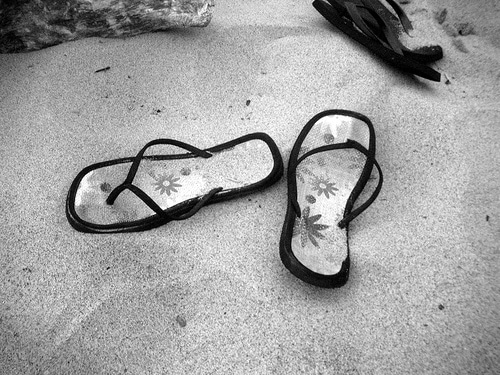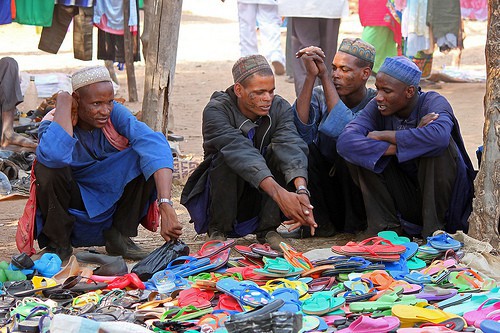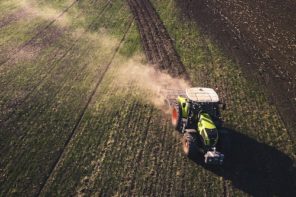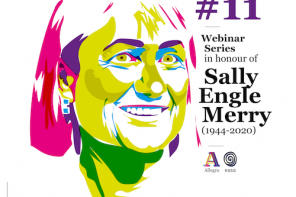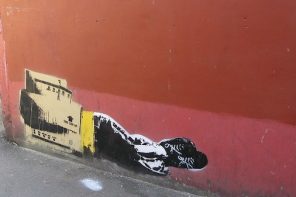Caroline Knowles’ Flip Flop presents a novel option for a long-demanded alternative approach to globalisation research. In the tradition of Appadurai’s (1992) Social Life of Things or Ian Cook’s (2004) “Follow the Thing: Papaya”, Knowles seeks to trace the adventures of the humble flip flop, from the oil fields of the Middle East to their entombment in Ethiopia as garbage, with a brief foray into their use and the mobilities they allow. While the commodity remains at the centre of her story, Knowles dives into the daily lives of people who are part of the life-course of this seemingly banal object.
The introductory chapter, “Navigating the Territories of the Trail,” frames the mission of the book, describing what the author sees as a neglected approach to object studies at the global scale.
She explains the value in looking at the details of material and fabrication, not merely circulation, enabling her to show how “plastic vibrates with the vitality of the social lives with which it is enmeshed” (p.4).
In this introduction, she sets out her critical framing of the lacuna this book fills as well as her methodological approach. She enumerates the considerable challenges she faced in doing this type of research: not merely difficulties of access, but struggles to squeeze time away from university and family responsibilities, to rethink expertise within a multi-sited project, and to follow an opaque trail whose end was unclear at the inception. At times, Knowles overstates the uniqueness of her intervention, giving short shrift to related fields of globalisation, mobilities and social geography, yet her use of a disposable plastic object to view practices large and small is a welcome intervention into Global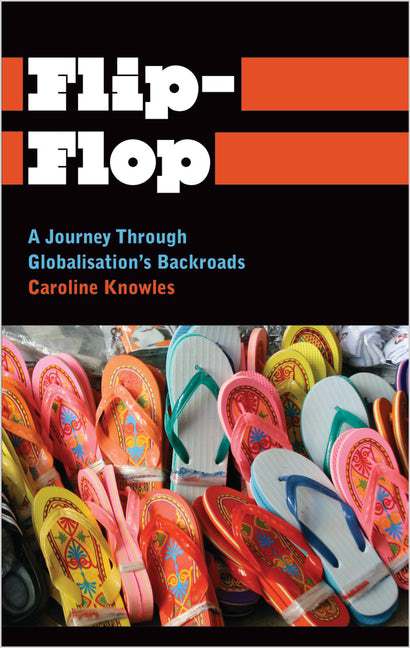
The introduction to this book is an anomaly within the text, and in the remainder Knowles avoids in-depth theoretical engagements. This is quite helpful within a text that will likely find its best audience in the classroom. Interested scholars will find an extensive set of notes, but the central adventures Knowles undertakes through Korean factories, Kuwaiti oil rigs and Ethiopian landfills are allowed to follow a clean narrative, introducing readers to various actors and processes along the flip-flop trail. Thick description of the “shoe biography” of a vegetable trader or a dinner-and-drinking evening with LG factory workers pull readers deeply into the lives of those who are involved in the journey.
She deftly moves from the particularities of a worker who cuts shoe bases out of plastic sheets and the embodied effects of this repetitive work to a more wide-angled view of practices of flexible production, deskilling and risk in the contemporary global factory system.
Such shifts of scale in the human and systemic are familiar in anthropology, yet I found Knowles unusual in her attention to the details of materiality. Her intricate discussions of different forms of plastic and methods of moulding and vulcanisation were as compelling as the human stories she tells. By introducing specificity in both technical processes and the lives of workers along the path, Flip Flop allows us to travel with the author through this adventure, as her fellow explorer. The work of examining issues like offshoring, specialised services and international trade law is in the text, but not overwrought. General information about the economy and cultural conditions in the locations she visits is woven into the story, allowing readers to learn about Special Economic Zones and Oil Wars along the way. This is an extremely useful technique for a student readership; important context, likely familiar to a scholarly audience, is offered throughout the book in a way that adds richness and readability to her story.
The moments when Flip Flop stumbles offer a valuable arena for critical thinking about the future of fieldwork research in a global era. When the book surveyed industries or locations with which I was unfamiliar, I found myself grateful for the background provided by Knowles, as in the discussion of the complex dynamics of Ethiopian-Chinese trade, or in the descriptions of thermoplastics and polyethylene granules, which were, or appeared to me to be, detailed and clear. Yet in areas with which I was more familiar, such as discussions of South Korean business culture or petroleum extraction and refining, I occasionally cringed at what I read as generalisations or incomplete explanations. I take this more as a comment on expertise and epistemology than Knowles’ book, and believe it highlights a contemporary conflict between area knowledge and globalisation approaches.
Knowles manages to infuse Flip Flop with scientific precision and technical detail while offering richly empathetic vision of factory owners, garbage pickers and others along the flip-flop trail.
To do this all and retain the book’s teachability, she must provide these interludes of contextualizing information, yet she is not able to provide the nuance or complexity that an expert in the area would. Nor does she make this claim; nor should she.
The last few years have seen a proliferation of texts designed for the classroom that seek to uncover the labour behind everyday items of clothing (e.g. Timmerman) but most offer little economic or cultural richness. These journalistic accounts rely on the stock drama of the sweat shop, and often cause brief horror to students before they continue along their consumer paths (see student reactions in “Mardi Gras: Made in China”). Knowles is seeking to walk a more subtle and difficult path with her commodity, providing readers with an understanding of the systems behind trade regulations, containerisation and the informal economy of garbage, without the many footnotes and “theory” that is anathema to many students. Experts in any of the arenas she explores may find quibbles with her discussion of a particular local instantiation of the flip-flop trail, yet I believe this book carves new ground for defining a “field” and maintains a challenging balance of elements that will do well in the classroom.
Knowles, Caroline. 2014. Flip-Flop. A Journey Through Globalisation’s Backroads. Pluto Books. 232 pp. Pb: £17.00. ISBN: 9780745334110.
References
Appadurai, Arjun ed. 1992. The Social Life of Things. New York: Cambridge University Press.
Cook, Ian et al. 2004. “Follow the Thing: Papaya.” Antipode 36(4): 642-664.
Mardi Gras: Made in China, DVD, directed by David Redmon. Carnivalesque Films, 2008.
Timmerman, Kelsey. 2009. Where am I Wearing? Hoboken, NJ: John Wiley & Sons.

